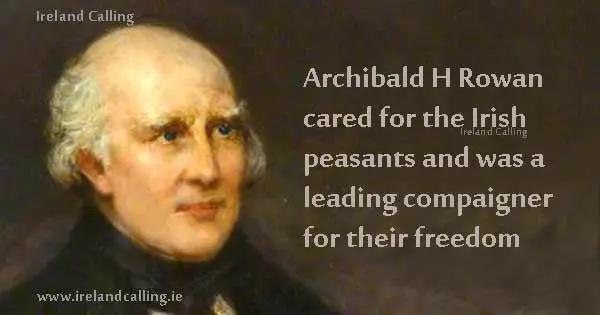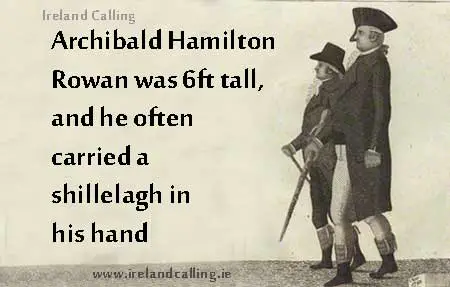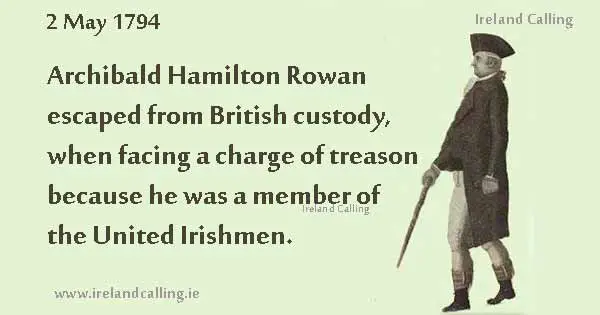Archibald Hamilton Rowan grew up in London with his grandfather, mother and sister for much of his early life. His granfather left him a large sum of money after he died.
However, Hamilton Rowan could only receive the money once he had acquired an Oxbridge education, and did not not visit Ireland until after his 25th birthday. He failed to gain the necessary qualifications that had been specified by his grandfather. In fact, he was expelled from Queens’ College, Cambridge for trying to throw one of his tutors into the River Cam. He did however, eventually receive his inheritance money anyway.
Rowan moved to Ireland
He travelled the world, seeing much of Europe, the Americas and Northern Africa. He moved to Ireland and settled with his wife and children. Despite his wealth, Hamilton Rowan cared for the Irish peasants and was a leading campaigner for their freedom.

Mary Neal and Lord Carhampton
An incident of a 14-year-old girl, Mary Neal, being assaulted by Lord Carhampton in 1788 was overlooked by the authorities, and many noblemen began to publicly berate the girl as a liar. Upon hearing this, Hamilton Rowan marched into an event attended by the aristocracy in Dublin.
Standing tall at 6ft, with his giant dog at this side and his shillelagh (stick) in hand, Hamilton Rowan threatened anyone who spoke a bad word about Mary Neal.

Co-founder of Dublin Society of United Irishmen
Two years later he founded the Dublin Society of United Irishmen with William Drennan and Theobald Wolfe Tone. When Britain and Ireland went to war with France, the United Irishmen movement was made illegal, and Hamilton Rowan was arrested and imprisoned.
Hamilton Rowan met Reverend William Jackson in prison. He was an Irishman working as a spy for the French, on a mission to gauge the public’s willingness to revolt against the British rule. Hamilton Rowan, Jackson and Wolfe Tone discussed the possibility of leading a rebellion, and made plans for their release.
Hamilton Rowan escapes from prison
However, the authorities were alerted to Jackson’s identity when he was betrayed by his friend. Jackson was tried with treason and Hamilton Rowan realised he had to escape before he faced the same fate. He managed to do so when he tricked his guard into allowing him a supervised visit to his wife, under the pretence of an urgent need to sign legal documents.
While he was on the visit, Hamilton Rowan excused himself for a moment and climbed out of an upstairs window down some tied-together bedsheets. He carried a razor blade with him, as he was unwilling to go back into jail and planned to take his own life before allowing himself to be captured.

Rowan escaped to America without his family
He travelled to France, before settling in Delaware, America. He was unable to access his fortune so worked as a labourer to survive. He lived in fear of being found by the authorities and returned to Britain to face treason charges and an almost certain death penalty. He believed he would never be able to return to Ireland and see his family and wrote a letter home to his children. Here is the opening sentence of Hamilton Rowan’s letter:
My dear Children,
Whilst residing at Wilmington on the Delaware, in the United States of America, not expecting to return to Europe, and unwilling to solicit my family to rejoin me there, I was anxious to leave you some memorial of a parent whom in all probability you would never know personally.
Rowan reunited with family in Germany
However, back in Ireland Hamilton Rowan’s wife was working tirelessly to get the British to ease their position regarding her husband’s return. Eventually they agreed not to arrest him if he travelled to a neutral country, and the family was re-united in Germany.
There was an even happier ending to Hamilton Rowan’s story. After the death of his father, the British agreed to drop any charges against him and allowed him to return to his native Ireland to live out the rest of his days. He did this and received a hero’s welcome by the Irish people.
history.html